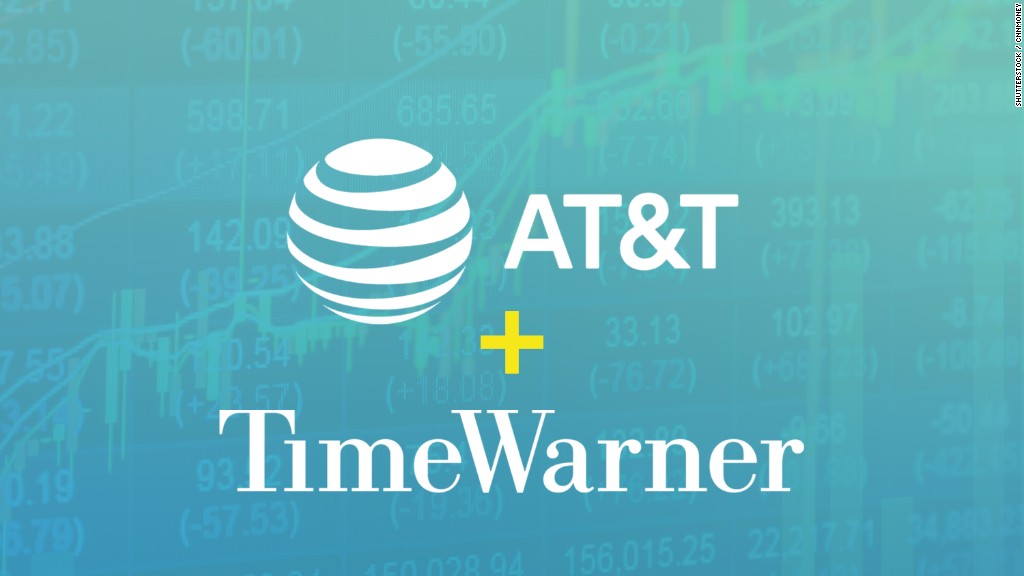
AT&T is bracing for an antitrust lawsuit from the Justice Department that would attempt to block its pending acquisition of Time Warner, CNN's parent company, on the grounds that it would harm consumers.
But the DOJ is having trouble finding allies.
The DOJ's antitrust division has been contacting some state attorneys general to enlist their support -- a common maneuver in cases like this.
But few, if any, states have signed on yet, according to an official in a state that has turned down the case.
A second source backed up this account.
More than a dozen states were involved in the DOJ's review of the deal, the source said. According to the state official, some of them concluded that the legal case to block the deal is thin. The official also expressed concern that the DOJ's case could be politically motivated.
Related: People have called AT&T about buying CNN; was Rupert Murdoch one of them?
CNBC was first to report the reluctance about the case among some states.
It's not necessary to have states on board, but the Justice Department works closely with state attorneys general on all sorts of issues. Joint actions are sometimes seen as a show of force. Last year, for example, eleven states joined the DOJ's lawsuit blocking Anthem's proposed $54 billion acquisition of Cigna.
A DOJ spokesperson declined to comment. Several state attorneys general also declined to comment.
AT&T has been preparing for a potential legal challenge to the deal. AT&T CEO Randall Stephenson said last week that if the DOJ sued, the company would seek an expedited hearing.
It is unclear if talks are still underway about an agreement that would stave off a court fight. But Wall Street analysts say they are anticipating a legal challenge.
"We now believe AT&T and Time Warner have been informed by the Department of Justice (DoJ) that a lawsuit is imminent," BTIG Research analyst Rich Greenfield said Tuesday night.
Earlier this week, executives involved in the process told CNN that the government's legal action could come at any time.
The $85 billion deal was announced in October 2016. But President Trump's election a few weeks later was a curveball. Republican administrations have historically been business-friendly, but on the campaign trail Trump vowed to block the deal, saying, "As an example of the power structure I'm fighting, AT&T is buying Time Warner and thus CNN, a deal we will not approve in my administration because it's too much concentration of power in the hands of too few." Since taking office, he has repeatedly and vociferously criticized CNN.
After a lengthy delay, the president's pick to run the DOJ's antitrust division, Makan Delrahim, took charge in September following eight months in the White House counsel's office.
Delrahim and his staffers have taken a skeptical approach to the proposed combination of content and distribution. In an interview he gave before joining the Trump administration, though, Delrahim had said he didn't expect the deal to be a big antitrust problem.
Related: Who is Makan Delrahim, the Trump antitrust chief?
Among observers, there are two competing narratives about what's going on. The first point of view is that the Justice Department is genuinely just intervening to protect consumers. The other point of view is that political games are being played.
Lawyers in the DOJ are typically insulated from political pressure, but in many ways the Trump administration is atypical. Trump has been critical of the DOJ and Attorney General Jeff Sessions all year long. He has recently urged the department to investigate his political rivals, including Hillary Clinton.
Several prominent Democratic lawmakers have questioned whether Trump's hatred of critical news coverage has trickled down into departmental decision-making.
AT&T may raise similar questions during the looming court fight, according to a recent report by Bloomberg.
President Trump fired off another shot at the network on Wednesday: "While in the Philippines I was forced to watch @CNN, which I have not done in months, and again realized how bad, and FAKE, it is. Loser!"
If the deal does go to court, AT&T may now cite his tweets as circumstantial evidence of presidential interference.
-- CNN's Kara Scannell and Jackie Wattles contributed reporting.


